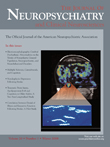Transient Amnestic Syndrome in the Setting of Recurrent Partial Elementary Seizures
To the Editor: The amnestic syndrome is a condition in which short term memory is disproportionately affected compared to other cognitive functions. 1 Transient disturbances in memory have been attributed to partial complex seizures, head trauma, transient global amnesia, alcohol abuse, and medication effects. 2 We would like to propose an addition to the causes of transient amnestic syndrome, as we present a case of recurrent partial elementary motor seizures with short term memory loss.
Our patient is a 53-year-old black male admitted to our teaching hospital with short term memory loss of 1 month’s duration. During a prior admission he was diagnosed with partial seizures and was discharged on carbamazepine. In the interval, he was noncompliant with carbamazepine. He underwent a comprehensive medical examination, which was within normal limits, except for a magnetic resonance imaging (MRI) scan of his brain which showed interval development of bilateral hippocampal disease. The EEG showed postictal slowing.
Cognitively, our patient exhibited marked short term memory loss, remembering 3/3 words immediately but 0/3 words at 3 minutes. The remainder of his Mini-Mental State Examination (MMSE) was normal. The only other significant feature was that our patient had motor symptoms such that his head, neck, and eyes deviated toward the right for about 10 sec. He was unaware of his seizures and resumed speaking postictally. During a typical 15 minute evaluation, our patient would have as many as five of these “motor episodes.” At this time, he was treated for recurrent partial elementary motor seizures and began carbamazepine.
By day four of treatment, he no longer demonstrated these motor episodes or short term memory deficits. An MRI of the brain and EEG were repeated. The EEG and hippocampal structure (per MRI) normalized. With significant improvement in transient amnestic syndrome, our patient was discharged on carbamazepine.
We have presented a case of recurrent partial elementary motor seizures resulting in hippocampal lesions on MRI and subsequent short-term memory impairment. The latter seems to be consistent with hippocampal function as the suggested site for short-term memory formation. 3 While partial complex seizures have been reported as a cause of transient amnestic syndrome, 2 there is less convincing evidence with partial elementary motor seizures. The mechanisms of transient amnestic syndrome, status/post partial complex seizures, could involve excitotoxicity within the hippocampus, 4 causing memory loss. During our patient’s previous admission, an MRI of the brain showed no hippocampal disease. That study corresponded to the earliest documented seizure activity. After 3 months of noncompliance with carbamazepine, the second MRI revealed interval changes in the hippocampus.
Interestingly, the seizure focus for partial elementary motor seizures spares the hippocampus and thus is not associated with transient amnestic syndrome. Because neurons are extensively interconnected, however, it can be proposed that excitatory activity can propagate itself across the brain, 5 possibly resulting in hippocampal lesions, especially with recurrent partial elementary motor seizures.
As for our patient, his seizure focus, presumably in the left motor cortex, “spread” to the hippocampus, resulting in the transient amnestic syndrome, which resolved with anticonvulsant therapy. Thus, we would like to suggest that recurrent partial elementary motor seizures be considered as an additional seizure type that could induce transient amnestic syndrome.
1 . Carson AJ, Zeman A, Myles L, et al: Neurology and neurosurgery, in The American Psychiatric Publishing Textbook of Psychosomatic Medicine. Edited by Levenson J. Arlington, Va., American Psychiatric Publishing, 2005, pp 701–732Google Scholar
2 . Kaufman D: Clinical Neurology for Psychiatrists, 4th ed. Philadelphia, WB Saunders, 1995Google Scholar
3 . Sadock B, Sadock V: Kaplan and Sadock’s Synopsis of Psychiatry: Behavioral Sciences/Clinical Psychiatry, 9th ed. Philadelphia, Lippincott Williams & Wilkins, 2003Google Scholar
4 . Jefferys JG: Mechanisms and experimental models of seizure generation. Curr Opin Neurol 1998; 11:123–127Google Scholar
5 . Nestler E, Hyman S, Malenka R: Molecular Neuropharmacology: A Foundation for Clinical Neurosciences. New York, McGraw-Hill, 2001Google Scholar



